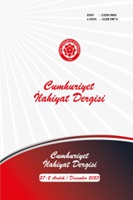Zâhirî Âlimler Nezdinde Halku’l-Kur’an Meselesi
The Issue of the Halku’l-Qur'an in the Eyes of Zahiri Scholars
Author(s): Hüsamettin KayaSubject(s): Philosophy of Religion, History of Islam, Sociology of Religion, Qur’anic studies
Published by: Cumhuriyet Üniversitesi İlahyat Fakültesi
Keywords: Hadıth; Zahiri; Halku'l-Qur'an; Mihna; Emergent; Pronounce;
Summary/Abstract: The Islamic thought has experienced many ruptures in history. One of them is the Mihna period. The main argument of the mihna period, which started during the reign of the Abbasid Khalifa Me'mun, was the issue of the khalq al-Qur'an. The leading figures of the period were dictated to accept the idea that the Qur'an was created. Those who took an opposing stance were oppressed and tortured. In this period, people like Ahmed b. Hanbal, who did not bow to oppresion, were made heroic by the people. This time, the reverse Mihna period started and those who spoke about the people of the Qur'an were criticized. Many of the muhaddith considered the approach to the issue of the khalq al-Qur'an as a bid'ah. This situation has created a field of criticism for people and segments who do not like each other. For this reason, unfair perceptions have been created about some people and their authorities in the society have been targeted with unfounded claims. Therefore, it is important to consider the approaches of Islamic scholars or sects to the subject objectively and to evaluate them in this context. In this study, the approaches of Dâwûd az-Zâhirî (d. 270/884), the founder of the Zâhirî sect, who were negatively affected by the situation in question, and other Zâhirî scholars to 'khalq al-Qur'an' were examined. In addition to the perception made about them, it is aimed to determine the accuracy of the discourses attributed to them. In this context, first of all, the views attributed to them are (i) The Qur'an in our hands, which consists of paper and ink, is not created, whereas the Qur'an in the preserved tablet is not created. (ii) The Qur'an is muhdes (created). (iii) The Qur'an is muhdes, and it is a creature in terms of its pronunciation. (iv) When the Qur'an is recited, the pronunciation that occurs as a result of the movements made by the servant to extract the letters has been classified as creature. These discourses attributed to them were compared with the information found in the works of Zâhirî scholars and it was determined whether they were consistent or not. As a result of the researches, Dâwûd az-Zâhirî, who was in Nishapur during the years when the mihna process continued, expressed some discourses about the creation of the Qur'an; however, with the end of the mihna, it was concluded that he gave up his discourses in question. Ibn Abi Asim (d. 287/900), Ibn Niftawayh (d. 323/935), Ibn Hazm (d. 456/1064), and Ibn al-Kaysarani (d. 507/1113), who are among the apparent scholars, have openly stated that the Qur'an is not a creature and they also blaspheme those who claim otherwise. In addition, it has been observed that the perception made independently of the correctness or falsity of the discourses attributed to them negatively affects the Zâhirî scholars in many ways. For example, it is because of this that Zâhirî scholars who are exposed to such perceptions lose value both in the eyes of the public and in the scientific assemblies.
Journal: Cumhuriyet İlahiyat Dergisi
- Issue Year: 27/2023
- Issue No: 2
- Page Range: 367-382
- Page Count: 16
- Language: Turkish

